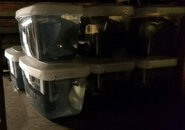Can you elaborate on
Does it damage the hard plastic?
It definitely can. I posted earlier in this thread about 2 different masks that I soaked in ammonia that had some hard plastic bits break and fall apart while still soaking in the ammonia.
Welcome to ScubaBoard, the world's largest scuba diving community. Registration is not required to read the forums, but we encourage you to join. Joining has its benefits and enables you to participate in the discussions.
Benefits of registering include
Can you elaborate on
Does it damage the hard plastic?
It definitely can. I posted earlier in this thread about 2 different masks that I soaked in ammonia that had some hard plastic bits break and fall apart while still soaking in the ammonia.

From a mask distributor, always read the manufacturers instructions before using anything on your mask!
View attachment 670591
OK, good advice. I read all that stuff and more. Clue me into anything from a manufacturer, I'll read all of it critically. Who are DGE's manufacturers?From a mask distributor, always read the manufacturers instructions before using anything on your mask!
@Lostdiver71 Please share one example of that. A link to who posted that, which manufacturer, and what coating?I love reading reviews for a mask that has an ant-fog coating on the inside of the lens and someone is complaining that their mask won't stop fogging up after using a lighter or soft scrub to damage the mask.
@Lostdiver71 Please share one example of that. A link to who posted that, which manufacturer, and what coating?
Way back in post #1:
"As simple as it seems that it should be, treatments to alleviate mask fogging remain a subject of hot debate. I remain surprised that one definitive answer has not been found long ago.
So, I would like to investigate this in a scientific way. This thread is a spin-off of Glass lens frameless Mask fogging issue in order to avoid a hijack of the OP’s original thread."
We are nearing a tested solution to 'taming' an inexpensive, low-volume, mass-produced, and uncoated mask. Your posts would be best served by creating a new thread.
